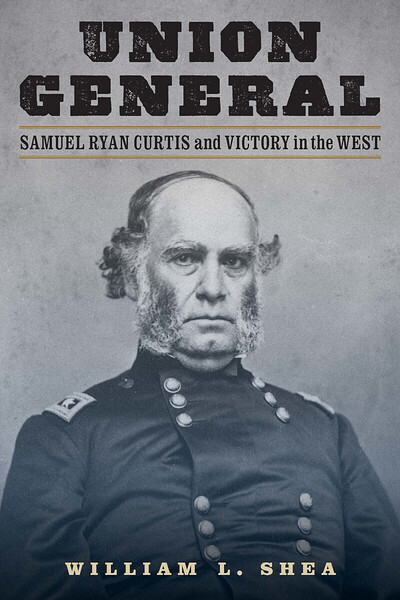Looking for a good read? Here is a recommendation. I have an unusual approach to reviewing books. I review books I feel merit a review. Each review is an opportunity to recommend a book. If I do not think a book is worth reading, I find another book to review. You do not have to agree with everything every author has written (I do not), but the fiction I review is entertaining (and often thought-provoking) and the non-fiction contain ideas worth reading.
Book Review
A Forgotten Successful General
Reviewed by Mark Lardas
February 12, 2023
“Union General: Samuel Ryan Curtis and Victory in the West,” by William L. Shea, Potomac Books, University of Nebraska Press, January 2023, 368 pages, $34.95 (hardcover, ebook)
Samuel Ryan Curtis was one of the North’s most successful generals during the American Civil War. He never lost a battle, and was the victor at several key battles, including Pea Ridge. He commanded Union forces in the Trans-Mississippi, negotiating peace with the Sioux late in the war. A nationally-known civil engineer pre-war, he helped found the Republican Party. Today he is almost entirely forgotten.
“Union General: Samuel Ryan Curtis and Victory in the West,” by William L. Shea, examines Curtis’s life. The first biography of the man, it is a worthy examination of his life.
Shea reveals an extraordinary man. Born near Lake Champlain in 1805, Curtis grew up in Ohio. He became in turn a clerk, a civil engineer (developing water projects and later railroad rights of way), a West Point cadet, a lawyer and a politician. During the Mexican-American War he commanded the Third Ohio Volunteer Regiment. He served as city engineer in St. Louis, then moved to Iowa to oversee public works and railroad projects in that state.
Curtis entered national politics in the 1850s. He was elected to the House of Representatives for Iowa in 1856. An early supporter of Abraham Lincoln, he helped Lincoln get the Presidential Nomination. Curtis sponsored the first transcontinental railroad act. When the Civil War started, he resigned his seat, commanding the Second Iowa Infantry. Shea follows Curtis through the Civil War, where he had an outstanding record, rising to command of the Army of the Border.
Shea examines the reasons why Curtis never got his due as a general. Curtis served exclusively west of the Mississippi, far from the press and public attention. Although Curtis attended West Point, Grant considered Curtis a political general, depreciating Curtis’s abilities. Curtis was an early abolitionist, a position unpopular in the war’s opening year. Finally, he died in 1866, before writing his memoirs. This all combined to reduce Curtis to obscurity.
Shea’s biography may focus well-deserved and fresh attention to Curtis. Shea is a worthy advocate of Curtis. This book, a well-written study of one man’s life, is both meticulously researched and a fascinating story, written in an engaging way. Shea reveals Curtis as someone important to American history. His contributions were important in three different fields: politics, engineering, and the military.
Mark Lardas, an engineer, freelance writer, historian, and model-maker, lives in League City. His website is marklardas.com.
